Rainmakers Seminar: leveraging data to navigate a storm of uncertainty
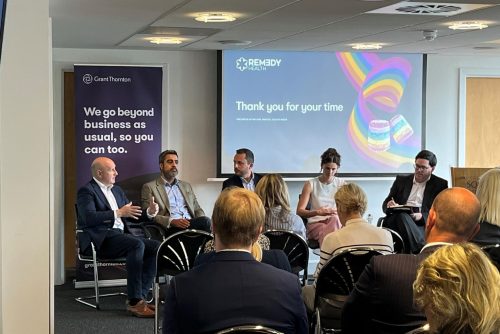
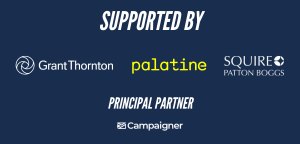
With political and economic stability on the horizon, the seminar focused on key topics shaping the financial landscape, including market demand, funding priorities, the growing importance of factors beyond the financials, and regional growth opportunities.
As 2025 approaches, businesses and Rainmakers are gearing up in anticipation of a more stable environment, where being deal-ready and leveraging data will be critical for success.
An expert panel of corporate finance and business leaders joined us to share insights and strategies for how the West Midlands Rainmakers can secure and support opportunities that will drive growth and innovation.
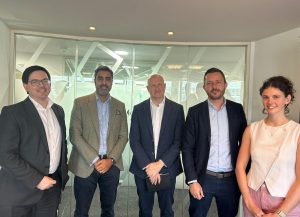
Alex Turner (TheBusinessDesk), Deepak Parekh (Shawbrook), Nick Gillott (Grant Thornton), Tom Hustler (Palatine) and Darcy Laceby (Absolute Collagen)
Nick Gillott, corporate finance partner at Grant Thornton said: “For years now, we have had uncertainty for one reason or another. The election has provided greater stability, and this, alongside improvements in inflation and interest rates, is helping deal flow, but clearly, there’s a big question mark with the pending October 30 Budget statement.
“We’re still very busy and getting busier, as everything that we’ve had well progressed in the pipeline is trying to complete by October 30, in case Rachel Reeves makes significant changes to CGT, and none of us know – that’s the biggest challenge.
“It remains uncertain because we could have anything on the spectrum of pushing those deals through, a slower M&A market after this date, through to quite a fast run to get more deals done by April 2025”.
“We’re still very busy and getting busier, as everything that we’ve had in the pipeline is trying to complete by October 30, in case Rachel Reeves changes CGT to something quite horrendous, and none of us know – that’s the biggest challenge.
“It remains uncertain because we could have anything on the spectrum of pushing those deals through. We’re expecting quite a fast run to get more deals done by April 2025”.
Deal had been taking “much longer” said Deepak Parekh, senior director at Shawbrook Bank. “We are closing transactions in these last six months that we’ve been looking at since back in the last year. We have also seen a huge push for completions to suddenly need to take place by the end of October, so that’s keeping us extremely busy at the moment.
“There’s definitely a recognition that this is the new norm and there will be another curveball that will be thrown in the direction of deal-doing over the coming months, whether that’s with CGT or elsewhere, but I think the important thing is we’re finding ways to work around issues and moving forward”.
Data has become increasingly important for businesses to weather the storm of uncertainty and makes them more investable too.
For Tom Hustler, senior investment director at Palatine, “uncertainty shines the light on those businesses that have really good data.”
He said: “If you can rely on your data to distil away a lot of the noise and make proper evidence-based decisions with confidence and conviction, those are the businesses that are flourishing.
“It’s very easy without that data to be almost paralysed by wondering if now is the right time to make that decision. Is now the right time to invest?
“Those businesses that have rich data sets to point to can back up entrepreneurs’ gut feelings and give people conviction to make decisions”.
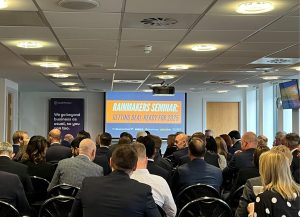
Launched by Maxine Laceby and her daughter Darcy in 2015, Absolute Collagen began life in the family kitchen.
Maxine and Darcy began to make collagen from bone broth in their kitchen, to improve their skin, hair and nails. Darcy, then 19, used her knowledge from studying Food Development at university to develop collagen supplements.
Darcy Laceby, co‑founder & chief people and product officer at Absolute Collagen said: “As we’re 100% direct to consumer, everything is digital. So when we went looking for investment, they told us that we had one of the cleanest data sets they’ve ever seen. We were already doing those things but not realising how important it was.
“We’ve recently launched in France and Italy and are looking at product development. In terms of our product portfolio, we’re still quite narrow. We only really have seven products, but within those seven products, we really understand the type of person buying those products, what they’re buying them for and the order in which to sell.
“80% of our revenue is based on subscription. We can understand buying behaviours such as what it means when someone logs into their account, and if it’s after x amount of days – we know they’re going to exhibit a certain amount of behaviour.
“Our data is detailed and when it comes to times of financial uncertainty, we can really delve into that data, especially with the subscription cohorts, and look at the changes and the reasons people are churning”.
Since launching, Absolute Collagen has grown to £30m turnover, became a B-Corp brand and secured a minority investment from Livingbridge. The mid-market private equity firm invested £15m in December 2020.
Laceby said: “Going into investment, I genuinely had no idea. We did go to advisors, and we spoke to a few of them at the beginning, but we went with the ones that understood us, our kind of needs and wants for the business and cared for the employees and the consumer.
“Learning all about funding became my bedtime reading, but I really enjoyed it, and I really learned a lot. We raised £15m for a minority share in the business, and that’s enabled us to do so much”.
For Nick Gillott, interesting opportunities are brewing in the manufacturing sector with an “evolving financial investor population that wasn’t there five years ago”.
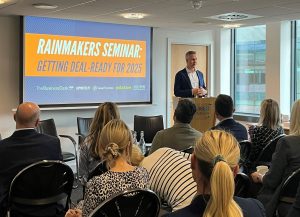
Tom Durrant, Squire Patton Boggs
Gillott said: “The sector is so important for the Midlands and we’ve seen a shift in that market with more family offices and manufacturing & industrial holding companies that can support those businesses with their capital investment needs, or for those without a succession plan for shareholders that want to retire.
“It’s quite a different space now in parts of the market that typically wouldn’t have been attractive to traditional private equity. It’s great to see a bridging gap to support what is the critical sector for our regional economy to drive growth, but also help shareholders find ways and means of realising their value”.
Factors beyond financials have become increasingly important, especially ESG.
Deepak Parekh believes that, “if you can demonstrate that you’re not just ticking the box for the sake of ticking, but generally delivering meaningful ESG, its impact is seen through the margins. I think it’s incumbent on organisations involved in helping businesses grow, to support ESG growth”.
At Palatine, Tom Hustler says the firm has been taking ESG seriously for about 12-13 years, but “whilst now “you can’t move without hearing those three letters – that wasn’t the case 5- 10 years ago.
“What we can demonstrate is the positive correlation between businesses that perform strongly from the ESG perspective and those that deliver the best returns”.





